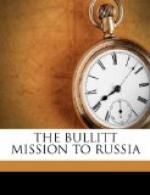ECONOMIC SITUATION
Russia to-day is in a condition of acute economic distress. The blockade by land and sea is the cause of this distress and lack of the essentials of transportation is its gravest symptom. Only one-fourth of the locomotives which ran on Russian lines before the war are now available for use. Furthermore, Soviet Russia is cut off entirely from all supplies of coal and gasoline. In consequence, transportation by all steam and electric vehicles is greatly hampered; and transportation by automobile and by the fleet of gasoline-using Volga steamers and canal boats is impossible. (Appendix, p. 55.)
As a result of these hindrances to transportation it is possible to bring from the grain centers to Moscow only 25 carloads of food a day, instead of the 100 carloads which are essential, and to Petrograd only 15 carloads, instead of the essential 50. In consequence, every man, woman, and child in Moscow and Petrograd is suffering from slow starvation. (Appendix, p. 56.)
Mortality is particularly high among new-born children whose mothers can not suckle them, among newly-delivered mothers, and among the aged. The entire population, in addition, is exceptionally susceptible to disease; and a slight illness is apt to result fatally because of the total lack of medicines. Typhoid, typhus, and smallpox are epidemic in both Petrograd and Moscow.
Industry, except the production of munitions of war, is largely at a standstill. Nearly all means of transport which are not employed in carrying food are used to supply the army, and there is scarcely any surplus transport to carry materials essential to normal industry. Furthermore, the army has absorbed the best executive brains and physical vigor of the nation. In addition, Soviet Russia is cut off from most of its sources of iron and of cotton. Only the flax, hemp, wood, and lumber industries have an adequate supply of raw material.
On the other hand, such essentials of economic life as are available are being utilized to the utmost by the Soviet Government. Such trains as there are, run on time. The distribution of food is well controlled. Many industrial experts of the old regime are again managing their plants and sabotage by such managers has ceased. Loafing by the workmen during work hours has been overcome. (Appendix, p. 57.)
SOCIAL CONDITIONS
The destructive phase of the revolution is over and all the energy of the Government is turned to constructive work. The terror has ceased. All power of judgment has been taken away from the extraordinary commission for suppression of the counter-revolution, which now merely accuses suspected counter-revolutionaries, who are tried by the regular, established, legal tribunals. Executions are extremely rare. Good order has been established. The streets are safe. Shooting has ceased. There are few robberies. Prostitution has disappeared from sight. Family life has been unchanged by the revolution, the canard in regard to “nationalization of women” notwithstanding. (Appendix, p. 58.)




